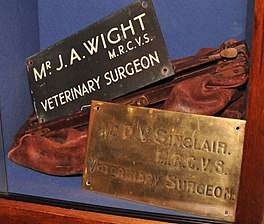Donald Sinclair (veterinary surgeon)

Donald Vaughan Sinclair (22 April 1911 – 28 June 1995) was a British veterinary surgeon (graduated from the Royal (Dick) School of Veterinary Studies, 1933) made famous as the eccentric character Siegfried Farnon in the semi-autobiographical books of James Herriot (Alf Wight), later adapted for film and television as All Creatures Great and Small.
Royal Air Force service
In 1939, he bought an existing veterinary practice at 23 Kirkgate, Thirsk, Yorkshire, and in July 1940 hired Wight to run it while he (Sinclair) was undertaking his war service in the Royal Air Force. However, Sinclair had deliberately misrepresented himself as being younger than he was in order to join up, and it was quickly discovered that his reflexes were not fast enough for him to continue with pilot training. He could have been redeployed within the service, but the fact that he was a veterinary surgeon (a reserved occupation) meant that he was considered more useful to the war effort by resuming his peacetime profession. The severe national food shortage meant that proper veterinary treatment of farm animals received a very high priority, and so within four months of joining the RAF he received a compulsory discharge and he returned to Thirsk.
Literary caricature
The fictional character Siegfried Farnon is portrayed as outspoken, opinionated, bossy, quick to lose his temper, and also quick to "blow over" — in short, bombastic. He is nonetheless basically good-hearted and an animal lover, fond of riding, and infuriated by any suspicion of deliberate cruelty to animals. One recurrent theme in Herriot's stories was Siegfried's criticism of James's flaws, such as forgetting appointments or leaving tools behind after calls, only for the reader to find that Siegfried is found guilty of the same things.
When Wight's first book was published, Donald was apparently most offended by his portrayal, saying "Alfred, this book is a real test of our friendship." (He never called Wight 'Alf' - mirrored in the books by Siegfried always referring to Herriot as "James" rather than "Jim".) Things calmed down, however, and the pair continued to work together until they retired. Opinion is divided as to whether Sinclair was as eccentric in reality as Siegfried was portrayed in the books, but it seems likely that even if his character was exaggerated, he was unique. Sinclair always refused to accept he was eccentric. However, former clients and colleagues, as well as Alfred Wight's own son in the book The Real James Herriot, stated that Sinclair's character in the novels was considerably toned down and that Sinclair was even more eccentric than the Herriot books portrayed.
Death
Sinclair took his own life by an overdose of barbiturate[1] on 28 June 1995 at his home Southwoods Hall, near Thirsk, two weeks after the death of his second wife Audrey (née Adamson), to whom he had been married for fifty-three years. His brother Brian ('Tristan' in the books) had died several years earlier, and his friend and partner, Alf Wight, only four months previously.
See also
References
- ↑ Wight, James (2001). The Real James Herriot: A Memoir of My Father. Ballantine Books. p. 357. ISBN 978-0345434906.
Further reading
- Wight, Jim (2001). The Real James Herriot: A Memoir of My Father. New York: Ballantine Books. ISBN 0-345-43490-0.
- Pace, Eric (1995-07-08). "Donald Sinclair, 84, Inspiration For Herriot's Veterinary Tales". The New York Times.
- Bell, Gavin (2004-01-10). "Make way sheep, we're Herriot fans". The Daily Telegraph.